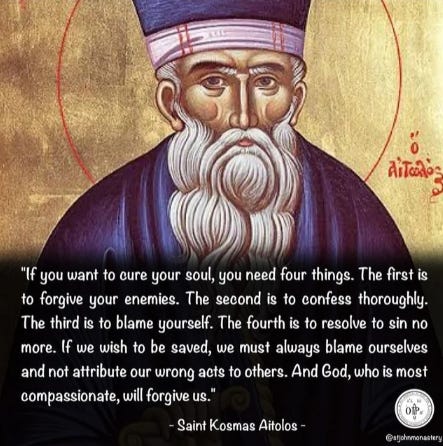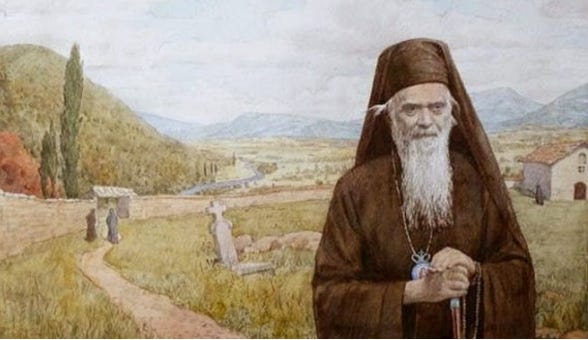Isaiah 65:8-16 (6th Hour)
8 Thus says the Lord: “As the new wine is found in the cluster, and one says, ‘Do not destroy it, for a blessing is in it,’ so will I do for My servants’ sake, that I may not destroy them all.
9 I will bring forth descendants from Jacob, and from Judah an heir of My mountains; My elect shall inherit it, and My servants shall dwell there.
10 Sharon shall be a fold of flocks, and the Valley of Achor a place for herds to lie down, for My people who have sought Me.
11 “But you are those who forsake the Lord, who forget My holy mountain, who prepare a table for Gad, and who furnish a drink offering for Meni.
12 Therefore I will number you for the sword, and you shall all bow down to the slaughter; because, when I called, you did not answer; when I spoke, you did not hear, but did evil before My eyes, and chose that in which I do not delight.”
13 Therefore thus says the Lord God: “Behold, My servants shall eat, but you shall be hungry; behold, My servants shall drink, but you shall be thirsty; Behold, My servants shall rejoice, but you shall be ashamed;
14 Behold, My servants shall sing for joy of heart, but you shall cry for sorrow of heart, and wail for grief of spirit.
15 You shall leave your name as a curse to My chosen; for the Lord God will slay you, and call His servants by another name;
16 so that he who blesses himself in the earth shall bless himself in the God of truth; and he who swears in the earth shall swear by the God of truth; because the former troubles are forgotten, and because they are hidden from My eyes.
Genesis 46:1-7 (Vespers, 1st reading)
1 So Israel took his journey with all that he had, and came to Beersheba, and offered sacrifices to the God of his father Isaac.
2 Then God spoke to Israel in the visions of the night, and said, “Jacob, Jacob!” And he said, “Here I am.”
3 So He said, “I am God, the God of your father; do not fear to go down to Egypt, for I will make of you a great nation there.
4 “I will go down with you to Egypt, and I will also surely bring you up again; and Joseph will put his hand on your eyes.”
5 Then Jacob arose from Beersheba; and the sons of Israel carried their father Jacob, their little ones, and their wives, in the carts which Pharaoh had sent to carry him.
6 So they took their livestock and their goods, which they had acquired in the land of Canaan, and went to Egypt, Jacob and all his descendants with him.
7 His sons and his sons’ sons, his daughters and his sons’ daughters, and all his descendants he brought with him to Egypt.
Martyr Terence and 40 others beheaded at Carthage
The Holy Martyr Terence and his companions suffered under the emperor Decius (249-251). The emperor issued an edict commanding all subjects to offer sacrifice to the pagan idols.
When the governor of Africa Fortunianus received this edict, he gathered the people into the city square, set out cruel instruments of torture and declared that everyone without exception had to offer the sacrifice to the idols.
Many, afraid of torture, complied. However, Saint Terence and forty other Christians bravely affirmed their faith in the Savior and ridiculed the idols. Fortunianus was amazed at their boldness and he asked how they as rational people, could confess as God, One Whom the Jews crucified as a malefactor.
Saint Terence answered that their belief was in the Savior, Who voluntarily endured death on the Cross and rose on the third day. Fortunianus saw that Terence inspired the others by his example, and so he ordered him to be isolated in prison with his three closest companions: Africanus, Maximus, and Pompeius. Fortunianus was determined to force the rest of the martyrs, including Zeno, Alexander and Theodore, to renounce Christ.
Neither threats nor terrible tortures could sway the holy martyrs. They burned them with red-hot iron, they poured vinegar on the wounds, they sprinkled on salt, and they raked them with iron claws. In spite of their sufferings, the saints did not weaken in their confession of Christ, and the Lord gave them strength.
Fortunianus gave orders to lead the martyrs into the pagan temple, and once again he urged them to offer sacrifice to the idols. The valiant warriors of Christ cried out, “O Almighty God, Who once sent down fire on Sodom for its iniquity, destroy this impious temple of idolatry.” The idols fell down with a crash, and then the temple lay in ruins. The enraged governor gave orders to execute them, and the martyrs, glorifying God, bowed their necks beneath the executioner’s sword.
After the execution of the thirty-six martyrs, Fortunianus summoned Terence, Maximus, Africanus and Pompeius before him. He showed them the martyrs’ bodies and again urged them to offer sacrifice to the idols. The martyrs refused. The governor put heavy chains on them, and gave orders to starve them to death. By night, an angel of the Lord removed the martyrs’ chains and fed them.
In the morning, the guards found the saints cheerful and strong. Then Fortunianus ordered sorcerers and conjurers to carry snakes and all kinds of poisonous creatures into the prison. The guards looked into the cell through an opening in the ceiling and saw the martyrs unharmed, praying, and the snakes crawling at their feet. When the sorcerers opened the door of the prison cell, the snakes bit them. The furious Fortunianus gave orders to behead the holy martyrs. Christians took up their holy bodies and buried them with reverence outside the city.
Reply to mockery with a smile
Saint Nicholas Velimirovich-By METROPOLITAN HILARION (ALFEYEV)
In the Name of the Father, and of the Son, and of the Holy Spirit!
Their mockery comes from a malicious heart; let your smile be without any badness. Mockery sits well with ignorance; a smile is more suited to knowledge. Through their mockery they’re increasing the value of your prayer before the eternal Judge. Because God is more enamored of the prayer of a bold soul, surrounded by the arrows of wickedness, hatred, envy and mockery. The tips of these arrows have been blunted and the base of the shafts sharpened, so that they’re warded off by you and pierce the archers who shot them.
David’s wife, Michal, once mocked the fervent prayer of her husband. God was more affronted by this mockery than King David was. This is why the Lord most high punished Michal: ‘And Michal, daughter of Saul, had no children to the day of her death’ (2 Kings 6, 23 [2 Samuel 6, 23]). If you pay attention to events and the fate of people, you’ll see for yourself that today, too, God punishes severely those who mock the sacred.
And if you think that any word is stronger medicine for them than silence, say to those mocking you: ‘Are my eyes deceiving me or am I seeing straight? Every day, you entreat merchants, land-owners and law-enforcers, each for a variety of reasons, and yet you’re mocking me because I entreat our eternal Creator. Isn’t it more ridiculous to ask for something from somebody who’s incapable, instead of going to the Almighty? Isn’t it absurd to venerate dust rather than the Lord, the Giver of life?’. It says somewhere in the prophet: ‘Cursed are they who place their hope in people’ (Jer. 17, 5). Those who place their hopes in mortal people, in a fleeting bubble and don’t lay it on God Almighty are obviously cursed. And this curse on them and their houses can be confirmed through everyday experience. It’s clear that, in the same way, those people are cursed who ask things of people but not of him who sustains everything and can do everything. But take note: sometimes silence is more effective than words.
The first mockery unsettles the soul that prays. But you’ve already survived and haven’t given up on prayer. Any further mockery is an incentive. You can tell yourself you already have experience. Now you feel that God’s somehow closer to you, the Church more beloved by you and prayer is sweeter. You should know that the time will come when the mockery will cease. Then people will come round, they’ll admire and praise you and then your soul will be in greater danger than it is now. Now you’re learning humility, but then you’ll be defending yourself against pride. But that’s another issue, a different temptation.
You should know that those who torment us with their mockery are precisely those who are our enemies. These are the people Christ was referring to when he gave the commandment ‘Love your enemies’ (Matth. 5, 44). Without knowing, they’re doing us good. By hurting us and troubling us, they’re lighting the flame of divine fire within us. They bark behind our backs when we’re on our way to church, but that just pushes us closer to God. By making the earth more tiresome for us, they make heaven more attractive. Frost and the wind don’t think about the tree, but even unwittingly they do it good. So it is with your enemies and you.
So forgive them and bless them, pray to God for them and- this is the culmination- love them as your greatest benefactors after God.
Pay frequent visits to houses of sorrow. Visit the grave-yard, as well. Think about Christ’s cross and kiss it as often as you can. And think about the end of life. All of this will help strengthen your resolve to pray and you’ll reach the final victory.
Peace and the Lord’s mercy.
This week’s calendar reminders:
Monday 4/7: Lenten Matins 8:30 a.m.
Tuesday 4/8: no services or events
Wednesday 4/9: Presanctified Liturgy 6:30 pm (potluck meal to follow)
Thursday 4/10: Lenten Matins 8:30 a.m.
Friday 4/11: no Matins, Vespers of Lasarus Saturday 7 p.m.
Saturday 4/12: Lazarus Saturday Liturgy 9.15 a.m., Vigil for Palm Saturday 6 pm
Sunday 4/13: Divine Liturgy 9:15am;
CLICK BELOW to donate online:
Christ the Savior Orthodox Church is located in Southbury, Connecticut, and is part of the New England Diocese of the Orthodox Church of America.
Mailing address: Christ the Savior Church, 1070 Roxbury Road, Southbury, CT 06488
PLEASE DONATE to help our parish do the work of the Lord, thrive and grow, and extend the Kingdom of God. May the Lord bless your generosity!
Fr. Moses Locke can be reached at frmoseslocke@gmail.com











